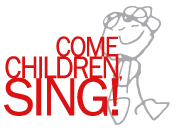The musical mind and the thinking mind of the child don’t really communicate with each other until more advanced stages of music development. The thinking mind takes precedence over the musical mind with songs with words, as language is the prime force in our culture. CCS Rhythm and Tonal Activities speak directly to the musical mind. They eliminate words, bypassing the thinking mind and strengthening the musical mind so it can eventually hold its own in the presence of songs with words. A developed musical mind will tend to the music in songs with words, if the musical sophistication of the song is worthy of the brilliance of the musical mind.
Traditionally, the difficulty of children’s songs has been determined by the difficulty of the words rather than by rhythm or tonal difficulty. Yet becoming educated requires that children be challenged in a discipline in an ongoing manner. Language development wouldn’t tolerate the words to children’s songs as developmental literature, as the songs do not meet graded criteria for learning language. Nor do they meet graded criteria for learning music. The field of music education wouldn’t tolerate instrumentalists playing music of the same level of difficulty through years of study, yet it does not challenge the lack of musical sophistication of children’s songs. Children deserve so much more. The musical mind is far more capable, and often disengages out of boredom, employing the thinking mind to choose favorite songs based on words.
Learning language includes speech and informal communication. At the other end of the spectrum is fine poetry—with its imagery, sound sense, and artistry. Somewhere in between is quality prose—more sophisticated than email, yet not such high art as poetry. Children don’t have to wait until they are ready for Shakespeare to engage in quality literature. As with language, children need a broad range of experience in song—informal songs, more musically sophisticated art songs—the poetry of music, and songs that are somewhere in between the informal and art songs—the prose of music learning. Songs that keep pace with and challenge rhythm and tonal development are essential for every age and stage of music learning. We’ll always need songs to do just for fun, but as children develop, more musically sophisticated songs become the fun. Musicality becomes the motivating force, just as it is for professional musicians.
See also:
|

